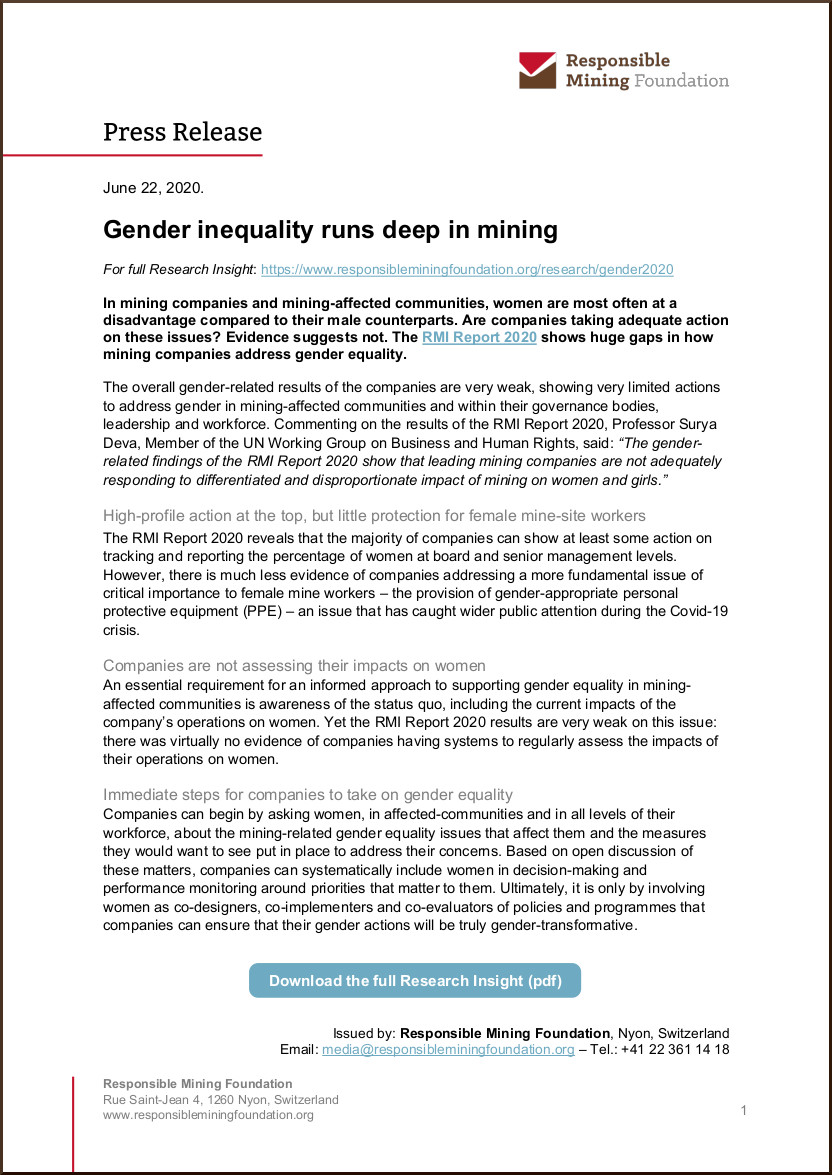Gender inequality runs deep in mining

|
Download the Press Release (pdf) ➥ 中文 ➥ English ➥ Español ➥ Français ➥ Bahasa Indonesia ➥ Português (BR) ➥ Pусский |
In mining companies and mining-affected communities, women are most often at a disadvantage compared to their male counterparts. Are companies taking adequate action on these issues? Evidence suggests not. The RMI Report 2020 shows huge gaps in how mining companies address gender equality.
The overall gender-related results of the companies are very weak, showing very limited actions to address gender in mining-affected communities and within their governance bodies, leadership and workforce. Commenting on the results of the RMI Report 2020, Professor Surya Deva, Member of the UN Working Group on Business and Human Rights, said: “The gender-related findings of the RMI Report 2020 show that leading mining companies are not adequately responding to differentiated and disproportionate impact of mining on women and girls.”
High-profile action at the top, but little protection for female mine-site workers
The RMI Report 2020 reveals that the majority of companies can show at least some action on tracking and reporting the percentage of women at board and senior management levels. However, there is much less evidence of companies addressing a more fundamental issue of critical importance to female mine workers – the provision of gender-appropriate personal protective equipment (PPE) – an issue that has caught wider public attention during the Covid-19 crisis.
Companies are not assessing their impacts on women
An essential requirement for an informed approach to supporting gender equality in mining-affected communities is awareness of the status quo, including the current impacts of the company’s operations on women. Yet the RMI Report 2020 results are very weak on this issue: there was virtually no evidence of companies having systems to regularly assess the impacts of their operations on women.
Immediate steps for companies to take on gender equality
Companies can begin by asking women, in affected-communities and in all levels of their workforce, about the mining-related gender equality issues that affect them and the measures they would want to see put in place to address their concerns. Based on open discussion of these matters, companies can systematically include women in decision-making and performance monitoring around priorities that matter to them. Ultimately, it is only by involving women as co-designers, co-implementers and co-evaluators of policies and programmes that companies can ensure that their gender actions will be truly gender-transformative.
Or read the Research Insight online:
www.responsibleminingfoundation.org/research/gender2020
Responsible Mining Foundation
The Responsible Mining Foundation (RMF) is an independent research organisation that encourages continuous improvement in in responsible mining across the industry by developing tools and frameworks, sharing public-interest data and enabling informed and constructive engagement between mining companies and other stakeholders.
As an independent foundation, RMF does not accept funding or other contributions from the minerals and metals industry.